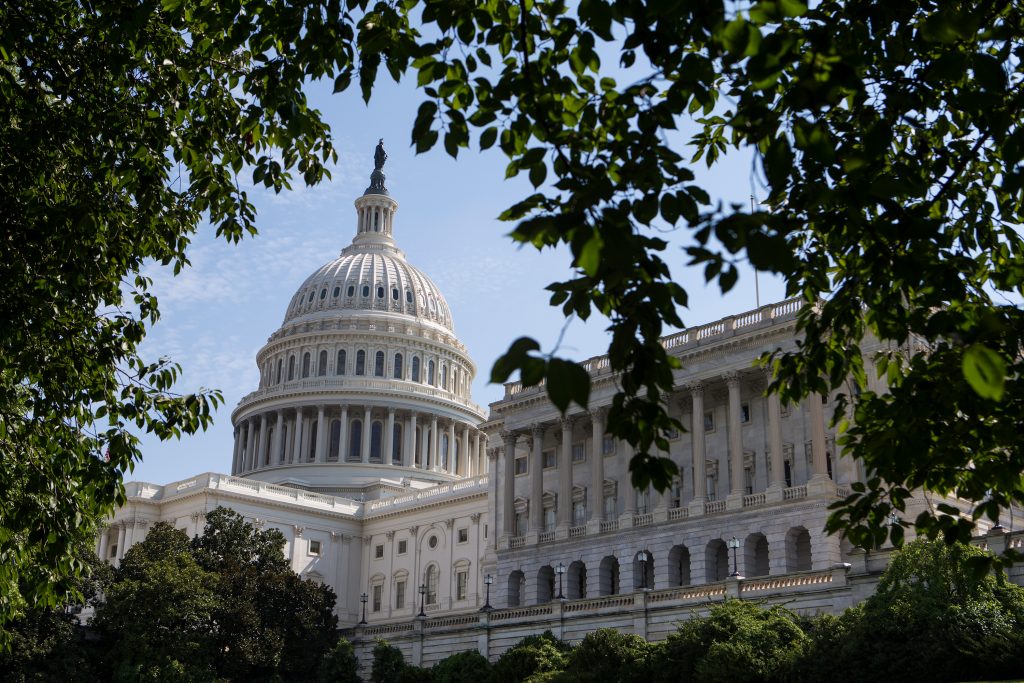WATCH LIVE: NPR, PBS heads answer lawmakers’ allegations of bias
WDET News, NPR March 26, 2025The hearing, entitled “Anti-American Airwaves: Holding the Heads of NPR and PBS Accountable,” was called by Greene in February to examine accusations by conservatives that news and cultural programming at the radio and television networks have a profound liberal bias.

The U.S. Capitol Building.
The CEOs of NPR and PBS are appearing Wednesday before a House subcommittee on government efficiency, chaired by Republican Rep. Marjorie Taylor Greene, where they will answer questions about perceived political bias at the public broadcasters.
Watch the livestream below, beginning at 10 a.m. ET.
The hearing, entitled “Anti-American Airwaves: Holding the Heads of NPR and PBS Accountable,” was called by Greene in February to examine accusations by conservatives that news and cultural programming at the radio and television networks have a profound liberal bias. She has expressed skepticism that any federal funds should go to public broadcasting.
PBS President and CEO Paula Kerger, who worked at New York City’s WNET public television before taking over the reins at the network nearly two decades ago, will appear beside NPR CEO Katherine Maher, who came to the public broadcaster last year from Web Summit. She is also a former CEO and executive director at the Wikimedia Foundation.
Wednesday’s hearing is part of a larger Republican-led effort to defund the Corporation for Public Broadcasting (CPB), established by Congress in 1967 as a private, nonprofit corporation to distribute federal money to NPR, PBS and other public broadcasting entities. Sen. John Kennedy, R-La., and Rep. Scott Perry, R-Penn., introduced legislation to bar all funding for the CPB. Meanwhile, Brendan Carr, President Trump’s newly appointed chairman of the Federal Communications Commission, has also initiated inquiries of NPR and PBS stations, arguing that their corporate underwriting spots violate federal laws and policies because they too closely resemble commercial advertisements.
NPR receives about 3% of its funding from the government, either directly via CPB or through its member stations, who pay fees to carry its programming. PBS receives 16% of its funds from the CPB.
NPR reaches 43 million listeners each week with its flagship news programs, Morning Edition and All Things Considered. Its programming is distributed by 230 member stations around the country, which together hold the licenses to 1,300 local public broadcasters. The programming at PBS ranges from the acclaimed News Hour to children’s programming such as Daniel Tiger.
Disclosure: This story was reported and written by NPR Correspondents Scott Neuman and David Folkenflik. It was edited by Deputy Business Editor Emily Kopp and Managing Editors Gerry Holmes and Vickie Walton-James. Under NPR’s protocol for reporting on itself, no NPR corporate official or news executive reviewed this story before it was posted publicly.
Trusted, accurate, up-to-date.
WDET strives to make our journalism accessible to everyone. As a public media institution, we maintain our journalistic integrity through independent support from readers like you. If you value WDET as your source of news, music and conversation, please make a gift today.
Authors
-
-
The mission of NPR is to work in partnership with Member Stations to create a more informed public — one challenged and invigorated by a deeper understanding and appreciation of events, ideas and cultures.
